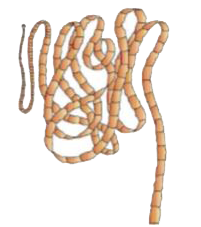Excretion and osmoregulation (definition)
Step-by-Step Text Solution
Step 1: Define Excretion
- Excretion is the biological process through which organisms remove metabolic waste products from their bodies. These wastes are generated during metabolic reactions and include substances such as carbon dioxide, urea, and uric acid. It is crucial to eliminate these wastes to prevent toxicity in the body.
Step 2: Identify the Organ Involved in Excretion
- The primary organ responsible for excretion in humans is the kidney. The kidneys filter the blood, removing waste products and excess substances, which are then excreted as urine.
Step 3: Define Osmoregulation
- Osmoregulation is the process by which organisms regulate and maintain the balance of water and electrolytes in their bodies. This is essential for maintaining homeostasis and ensuring that cells function properly.
Step 4: Explain the Role of Osmoreceptors
- Osmoregulation is facilitated by specialized cells called osmoreceptors. These receptors have the ability to detect changes in osmotic pressure, which is the concentration of solutes in body fluids.
Step 5: Identify Locations of Osmoreceptors
- Osmoreceptors are primarily located in the brain, specifically in the hypothalamus, and in the kidneys. They play a critical role in monitoring and adjusting the body’s water and electrolyte levels.
- Excretion is the biological process through which organisms remove metabolic waste products from their bodies. These wastes are generated during metabolic reactions and include substances such as carbon dioxide, urea, and uric acid. It is crucial to eliminate these wastes to prevent toxicity in the body.
- The primary organ responsible for excretion in humans is the kidney. The kidneys filter the blood, removing waste products and excess substances, which are then excreted as urine.
- Osmoregulation is the process by which organisms regulate and maintain the balance of water and electrolytes in their bodies. This is essential for maintaining homeostasis and ensuring that cells function properly.
- Osmoregulation is facilitated by specialized cells called osmoreceptors. These receptors have the ability to detect changes in osmotic pressure, which is the concentration of solutes in body fluids.
- Osmoreceptors are primarily located in the brain, specifically in the hypothalamus, and in the kidneys. They play a critical role in monitoring and adjusting the body’s water and electrolyte levels.
Topper's Solved these Questions
- HUMAN BODY: THE EXCRETORY SYSTEMBOOK - ICSECHAPTER - HUMAN BODY: THE EXCRETORY SYSTEMEXERCISE - EXERCISES (SECTION II (GIVE REASONS FOR THE FOLLOWING))
5 Videos
- HUMAN BODY: THE EXCRETORY SYSTEMBOOK - ICSECHAPTER - HUMAN BODY: THE EXCRETORY SYSTEMEXERCISE - EXERCISES (SECTION II (SHORT ANSWER QUESTIONS))
5 Videos
- HUMAN BODY: THE EXCRETORY SYSTEMBOOK - ICSECHAPTER - HUMAN BODY: THE EXCRETORY SYSTEMEXERCISE - EXERCISES (SECTION II (DEFINE THE FOLLOWING TERMS))
5 Videos
- HEALTH AND HYGIENE: ALLERGYBOOK - ICSECHAPTER - HEALTH AND HYGIENE: ALLERGYEXERCISE - EXERCISES (PICTURE STUDY)
10 Videos
- HUMAN BODY: THE NERVOUS SYSTEMBOOK - ICSECHAPTER - HUMAN BODY: THE NERVOUS SYSTEMEXERCISE - PICTURE STUDY
10 Videos
Similar Questions
Knowledge Check
Osmoregulation is the function of
AprolactinBoxytocinCvasopressinDNone of these
Organs of excretion and osmoregulation in Platyhelminthes are
View Solution(a) Hooks and suckers are present
(b) Absorb nutrients from the host directly through their body surface
(c) Specialised cells called flame cells help in excretion and osmoregulation
(d) Sexes are separate Which of the above given charater is not related with diagram given below?

View SolutionDefine the Osmoregulation
View SolutionExcretion and respiration (process)
View SolutionOsmoregulation is maintained by
View SolutionStructures which help in osmoregulation and excretion in flatworms are called.
View SolutionWhich structures help in osmoregulation and excretion in Annelids?
View Solution
